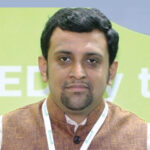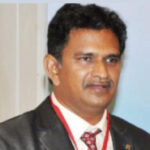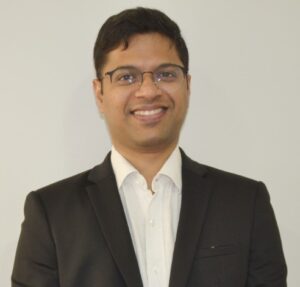Consistent Engineering Consultants’ three-part Sustainability Webinar Series attracted experts from the GCC region, India, Europe and elsewhere, who presented actionable strategies and solutions for optimising resources and for meeting other HVAC-relevant UN Sustainable Development Goals at macro and granular levels

Sagar Kulkarni
Sustainability is the golden mean of cost and efficiency, said Sagar Kulkarni, Managing Director, Consistent Engineering Consultants, during the first (GCC region) edition of a three-part webinar series, titled ‘Securing Sustainable Futures’, on August 31. Kulkarni set the tone for the discussions, hosted by Consistent Engineering, with the aim of challenging the myths surrounding sustainability. The first edition highlighted what stakeholders can do to move the dial when it comes to making a change in the industry, keeping in mind the United Nations Sustainable Development Goals (UN SDGs).

Deepthy KB
The edition witnessed a plenary interaction amongst the designated panelists, with Deepthy KB, Regional Director – Middle East, Green Business Certification Inc. (GBCI), pointing out that a common misconception related to the idea of sustainability is that it is expensive and time consuming. “Buildings today need to be efficient, but moreover they should be resilient,” she stressed. “There should be a conscious shift for spaces to embrace sustainability, whilst being resilient and healthy, integrating aspects of social equity (or equality?). Through LEED, we have integrated all these aspects into the work we do.”

Ahmad Elgebaly
Ahmad Elgebaly, Project and Design Management, White Space Architect, weighed in to say that there is a need for awareness amongst developers and end-users on building design’s contribution to climate change. “We try to inform clients regarding sustainability factors when it comes to designing spaces, buildings, neighbourhoods and even cities, and I think it is a really important step,” he said. Saravanan D, Senior Sustainability Specialist, ENOC, also chimed in to say that even during such challenging times, as the world is currently facing, sustainability is no more an option. “It actually makes very good business sense, because it is contributing in terms of cost reduction, ultimately going to our bottom line and helping our image as a more socially responsible company.” he said. “Our employees are trained and made aware of how the building that they are working in is a green building. Every department has a YoY (year-on-year) target of reducing waste by 10% per employee.”
 Providing a government perspective, Henrique Pereira, Senior Manager, Energy Services, Energy Efficiency and Renewables Office (Reem), Ras Al Khaimah Municipality, pointed out that when it comes to achieving sustainability in buildings and constructions, policies should be more performance-driven than detail-oriented. “Create awareness around why people should contribute to a certain initiative while adopting a goal, and make them understand the value it will create eventually,” he said. “Data is at the centre of every policy or regulation that is being made.”
Providing a government perspective, Henrique Pereira, Senior Manager, Energy Services, Energy Efficiency and Renewables Office (Reem), Ras Al Khaimah Municipality, pointed out that when it comes to achieving sustainability in buildings and constructions, policies should be more performance-driven than detail-oriented. “Create awareness around why people should contribute to a certain initiative while adopting a goal, and make them understand the value it will create eventually,” he said. “Data is at the centre of every policy or regulation that is being made.”

Nandini Sampat
The second (India) edition of the webinar, on September 8, also featured a plenary discussion – this time, on the nuances of adopting sustainability in construction. Nandini Sampat, Director, SNK, Somaya and Kalappa Consultants, spoke on how India’s long tradition of sustainable architecture paves the way for the country to become a leader in sustainable practices. “Sustainability should extend beyond just the walls of your building and get into the way of life,” she said. “Every architect should be a conservation architect and must look at conserving the history of the building, by reusing what can be reused – amalgamating the old and new and, yet, giving a building a new identity.”

Padmanabh Subramanian
Following the same train of thought, Padmanabh Subramanian, Regional Head – Market Development, GBCI India, spoke on how the country has long been a leader in the green building movement, pointing out that India has ranked number four in the world when it comes to developing spaces that successfully exhibit green building parameters. “Awareness among all the stakeholders through an integrated approach is important when it comes to being a certified green building,” he said. Subramanian also discussed performance monitoring and benchmarking for existing buildings. “Performance monitoring, tracking and benchmarking from the O&M perspective in existing buildings are essential today in order to achieve sustainability goals and create spaces that are better for people,” he said.

Dr G R Narsimha Rao
Dr G R Narsimha Rao, Director, Industrial Energy Efficiency, TERI, spoke on energy efficiency and the adoption of renewable energy in India. “Renewables, along with batteries, are being planned in a manner to establish peak demand management and grid harmonisation,” he said, adding that up to eight per cent energy savings can be achieved with rooftop solar systems in the industrial sector. He said that the central government in India is strongly pushing concepts like floating solar systems in the smart cities programme, along with renewable energy policies.

Hrushikesh Kolatkar
Hrushikesh Kolatkar, Environmental Specialist and Managing Director, Building Environment (India) Pvt Ltd., weighed in to discuss the importance of sustainability as the legacy of successive generations. Another participant, Sameer Sinha, Founder and Managing Director, Savvy Group, pointed out that sustainable development is the only way ahead, asking fellow experts, “It’s a responsible and profitable way to build and operate – what other way is there?”

Sameer Sinha
The insights of such participants found further expression during the third and final leg of the webinar, on September 22, called the Synergy Edition. It referred to the observations made during the earlier editions with the aim of further sharpening the green message and emerging with actionable green plans and strategies. Kulkarni said, “From the last two sessions, we have understood that to bring about any change or development, we first need awareness.”

Alejandro Vera Casso
In the Synergy Edition, Alejandro Vera Casso, Senior Advisor on Impact Finance, UNIDO, Founding Partner, ICD Impact, Vienna, Austria underlined the importance of the UN SDGs, drawing his experience contributing to the drafting of SDG 9. “We had to prove the industry was a friend, and we had to prove everything the industry proposes, in terms of new technologies, will ultimately have a good and positive impact, so this aspect of proving that industry is a development partner was a whole agenda,” he said, adding that this also led to stronger collaboration among government entities.

Dominic Mc Polin
Providing insight as a representative of the government, Dominic Mc Polin, Chief, Central Planning – Central Planning Office, Ministry of Works, Municipalities Affairs and Urban Planning, Bahrain, confirmed that undoubtedly, the need for global solidarity is more important than ever in view of the pandemic, the resulting economic fallout and the increasingly devastating effects of climate change. “I see the silver lining that COVID has changed us and changed us for the better in order to face the realisation of these goals,” he said. Henrique Pereira, who participated in the first edition, shared the same sentiment, adding: “We are part of something bigger, part of different multi-lateral agreements and cooperation, which we also hope to influence and evolve on the roadmap we define for ourselves.”

Gopalakrishnan Padmanabhan

Amruta Kshemkalyani
While government drive remains strong, there is an equal need to educate people on the ground, with Gopalakrishnan Padmanabhan, Managing Director, SE Asia and Middle East, GBCI, pointing out that awareness is critical. “Every year, at USGBC and GBCI, we do quantitative research to understand the obstacles to sustainability and impediments and what can accelerate the adoption,” he said. Some of the obstacles were highlighted by Kolatkar, who said, “We see there are some of the usual investors, who do not see the complete picture.” Amruta Kshemkalyani, Founder and Sustainability Advisor, Sustainability Tribe, said that in her experience, a critical issue is convincing clients to go for green buildings or more sustainable measures, in general. “The factor there is if the client is aware of the adverse impact of ‘business as usual’ now, on why they should invest, and the education and awareness.”

Prashant Jadhav

Rahul Shetty
Kulkarni emphasised that it is crucial to look at sustainability at every level from the lens of individuals, organisations and governments. Issuing a reminder that industry must be more proactive than reactive, he shared key takeaways that emerged from the webinar series and advocated for greater partnership across regions and industries in pursuit of the UN SDGs.
#UNSDG #UNSDGs #UNSustainableDevelopmentGoals #sustainable #sustainability #sustainabledevelopment #HVAC #HVACR #buildingperformance #energyefficiency #GBCI #USGBC #LEED #RAKMunicipality #RasAlKhaimah #RasAlKhaimahMunicipality #UNIDO #ENOC #architect #architecture #data #construction #O&M #TERI #renewables #renewableenergy #solar #solarenergy #rooftopsolar #grid #gridharmonisation #smartcities #smartbuildings #climatechange #climatecrisis #climatechangemitigation #BahrainMinistryofWorks #Bahrain
Copyright © 2006-2025 - CPI Industry. All rights reserved.